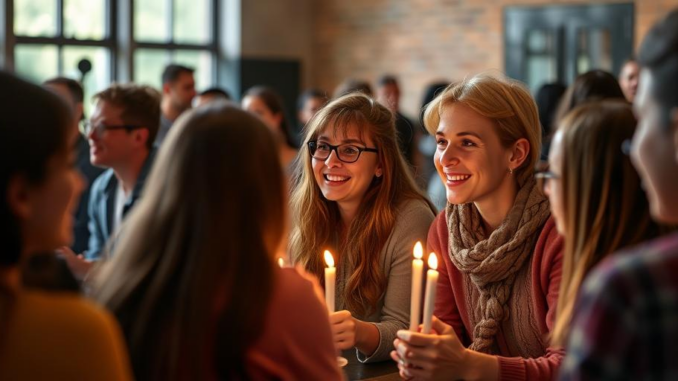
Summary
This article explores the contrasting attitudes of older adults toward engagement and enjoyment in two community programs: neighborhood lunch programs (NLPs) and lifelong learning programs (LLPs). Research suggests that LLP participants prioritize engagement and social contribution, while NLP participants focus on enjoyment and relaxation. These findings underscore the importance of diverse programs catering to the varied needs and preferences of older adults.
Main Story
Alright, let’s dive into something I’ve been mulling over: how we’re supporting our aging population. It’s becoming more and more important to really understand what older adults actually want and need, so we can create programs that truly make a difference. Think of it like this: community programs are lifelines for many seniors, offering everything from a warm meal to a chance to learn something new. But, are we tailoring these programs enough? Because what motivates one person might bore another to tears, right?
So, I’ve been looking at two different types of programs: neighborhood lunch programs (NLPs) and lifelong learning programs (LLPs). And honestly, the differences in what people get out of them are pretty striking.
Neighborhood Lunch Programs: More Than Just a Meal
NLPs? They’re a big deal. Seriously. They offer not just a nutritious meal (which is crucial!), but also a social lifeline. You see, social isolation is a real problem for many seniors. It’s linked to depression, declining health… the works. NLPs combat this head-on by creating a structured environment where people can connect.
Think about it: sharing a meal encourages conversation, laughter, and the building of friendships. It creates a sense of belonging, a community. And, let’s be real, sometimes just having someone to talk to over a hot meal can make all the difference in the world. Plus, for seniors who live alone, these programs ensure they’re getting a balanced diet and regular meals. It’s a win-win.
Many of these programs also offer other activities too. Gentle exercise, games, or even informational sessions on health and wellness. I remember volunteering at one a few years ago, and it was amazing to see how much the seniors enjoyed the simple act of playing bingo together. The atmosphere was just pure, unadulterated joy. The focus here is squarely on enjoyment, relaxation, and connecting with others. It’s comfortable, familiar, and welcoming. You can’t underestimate the power of that.
Lifelong Learning Programs: Never Stop Growing
Now, LLPs are a different beast altogether. Forget relaxation; this is about intellectual stimulation and personal growth. These programs offer a smorgasbord of courses and workshops: history, literature, technology, arts… you name it.
And the best part? No exams, no grades, just pure, unadulterated learning for the sake of learning. It’s like a playground for the mind. LLPs create a vibrant community of curious individuals, sparking intellectual discussions and shared exploration.
There’s a lot of research that highlights the importance of keeping your mind active as you age. LLPs do just that, helping maintain mental sharpness and overall well-being. It’s about more than just acquiring knowledge; it’s about finding purpose, staying engaged, and feeling like you’re still contributing to society. Participants in LLPs often have a strong desire to stay involved, take on responsibilities, and share their skills. And honestly, that’s incredibly inspiring.
Engagement vs. Enjoyment: A Tale of Two Priorities
When you look at the attitudes of seniors in NLPs versus LLPs, a pattern emerges. It’s really about two different priorities: engagement and enjoyment. People in LLPs often score higher on measures of engagement. They want to stay responsible, contribute to their communities, and actively participate in the world around them. Learning, for them, is a way to grow, stay intellectually sharp, and feel connected. On the flip side, NLP participants tend to prioritize enjoyment and relaxation. They value the chance to socialize without the pressure of structured learning. They might be looking to unwind, savor life’s simple pleasures, and connect with others over a shared meal. There’s nothing wrong with that at all.
The Key Takeaway? Choice Matters.
So, what does all this mean? It highlights the importance of offering a diverse range of programs that cater to different needs. Some seniors thrive on the intellectual challenges of LLPs, while others find comfort and fulfillment in the relaxed environment of NLPs. It’s about recognizing and respecting these individual differences. There’s no one-size-fits-all approach to healthy aging. We need to empower seniors to choose the activities that best suit their preferences, supporting them in living fulfilling and meaningful lives. And, as our population ages, more research into the benefits of these programs is crucial. What do you think, is there anything we’re missing?


So, lifelong learning folks want engagement? Is that why the bingo games at the lunch programs are so sparsely attended, or is it just that quadratic equations don’t pair well with mashed potatoes?
That’s a funny point! It really highlights the difference in priorities. While some find joy and connection in simpler activities like bingo and a shared meal, others seek engagement through intellectual pursuits. Maybe we need to introduce ‘Math & Mash’ – a quadratic equation discussion group *during* lunch!
Editor: MedTechNews.Uk
Thank you to our Sponsor Esdebe
So, LLPs are playgrounds for the mind, while NLPs are social spas? Perhaps we need a “Brain & Body” combo – Zumba followed by a lecture on the socio-political implications of interpretive dance.